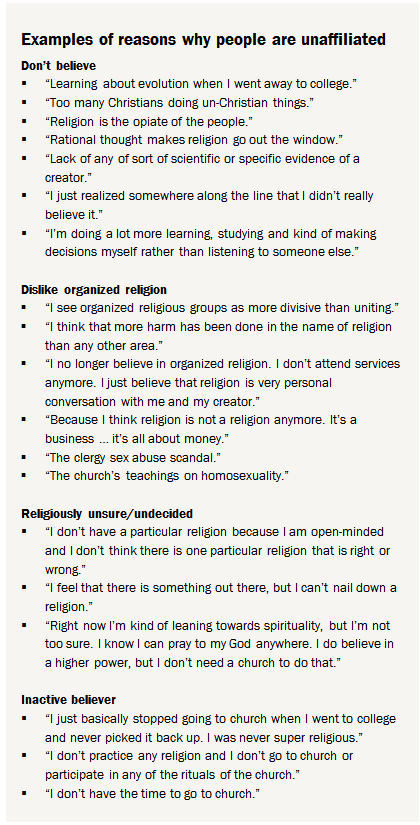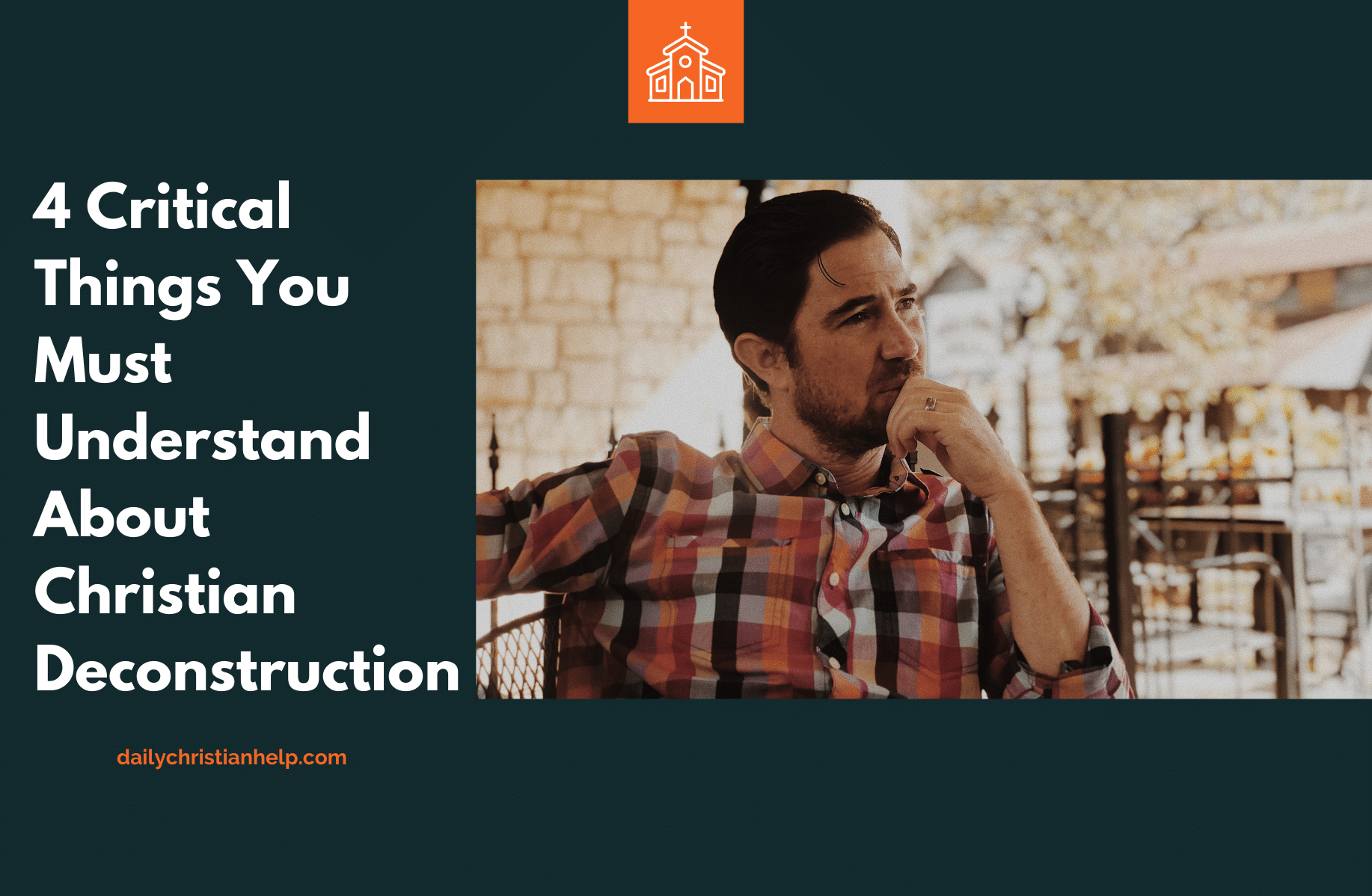Recently, Christian deconstruction has almost become synonymous with losing one’s faith. However, is this always necessary or even what it means? Is it possible that people who are reconstructing faith can actually strengthen it?
Can Christians deconstruct their beliefs without losing their faith?
Pinpointing the questions you wrestle with and precisely identifying the faith issues you struggle with is a vital aspect of Christian deconstruction.
Haphazeroudly, associating your questions about Christianity with deconstruction, without understanding what you’re wrestling with or why can be as destructive as using a wrecking ball to take apart a wall that only requires a hammer and prybar.
Many face a spiritual crisis for various reasons. Sometimes, our faith’s condition or purpose is disorienting, and we find ourselves questioning its validity and integrity.
Anyone can find God useful. Growing Christians find God beautiful. – Tim Keller
What happens when your faith no longer feels useful, but you still want to see God’s beauty? And, why does it seem this way?
If you’re looking for how to deconstruct in hopes of abandoning or renouncing your Christian faith, I offer no suggestions. But if you’re considering that some parts of your beliefs may need evaluation, adjustment, or severing and need help assessing, keep reading.

What Is Christian Deconstruction?
Strictly speaking, Christian deconstruction is critiquing deeply held beliefs of one’s faith, particularly within evangelical circles. In popularity, Christian deconstruction requires untangling the ideas and practices keeping one’s faith together up to this point while also uncovering any unhealthy baggage.
Still, Christian deconstruction is somewhat ambiguous given its nature and loose connection to deconstruction theory.
What Is Deconstruction Theory?
Deconstruction theory is the breaking apart of text when possibly ambiguous concepts are present. Deconstructionism originated in literary theory from Jacques Derrida to draw subjective meaning out of the text. It is used to deconstruct literary works and reassemble them with contextual meaning drawn from the culture and experiences of the reader.
Deconstructing is to take a text apart along the structural “fault lines” created by the ambiguities inherent in one or more of its key concepts or themes to reveal the equivocations or contradictions that make the text possible. – iep.utm.edu
Ultimately, deconstruction theory suggests that the point of language is not to communicate meaning but to leave room for interpretation due to various contexts.

Much of the problem with this theory is that it is circulatory by nature and never fully able to conclude. It is always open to three conflicting attributes: historical circumstances, the nuance of interpretation, and the life experience of those reading.
Deconstruction is a form of criticism first used by French philosopher Jacques Derrida in the 1970s, which asserts that there is not one intrinsic meaning to be found in a work, but rather many, and often these can be conflicting. – tate.org
Derrida argues that language has no meaning in a vacuum. Its meaning comes from the reader’s cultural values, experiences, and understanding. To the deconstructionist, meaning is an emergent property that arises from the interaction between the text and the reader.
The deconstruction concept further escalates one’s inability to arrive at reasonable conclusions because, according to this theory, the location of meaning within a text is in one of three places: The writer, the text, or the reader.
This conundrum begs the question, what reliable conclusion do deconstructionists arrive at if accurate interpretation is lost due to an untraceable location of meaning?
And for those in the midst of Christian deconstruction, what practices are helpful to deconstruct your beliefs without leaving meaning solely in the hands of your own interpretation.
Is Christian Deconstruction Different From Deconstruction Theory?
Most people who identify with Christian deconstruction are sorting out their beliefs with different motives than deconstruction theory, yet similar results – their interpretation of Christianity shifts. Christian deconstruction primarily focuses on detangling beliefs that individuals have held onto for years or the faith traditions they grew up possessing.
For many Christians, deconstructing faith means examining whether the version of Christianity they are familiar with is consistent with the Bible.
In this sense, a call for deconstruction is effectively a call for reformation. It’s saying there just might be things in the church that are seriously broken or problematic. And the church should work to change these things when they’re discovered. – michaeljkruger.com
Elements of a church or the Church may be dysfunctional and need repairing. And, if so, are there commonalities to identify that can help clarify where churches can start?
In this sense, Christian deconstruction is different from deconstruction theory. However, within other circles, it can be much the same. Often, deconstruction and deconversion are interchangeable or jumbled together. It’s helpful to clarify and set parameters for the two approaches:
Christian Deconstruction: Careful examination of one’s beliefs to reveal flaws and expose areas of faith and function that are unlike Christ
Christian Deconversion: Removal from and rejection of Christianity.
Which is your goal: deconstruction or deconversion? Distinguishing the difference and understanding your purpose is vitally important if you want to detangle your beliefs without wandering in a desert of confusion.
Is it possible to deconstruct aspects of your faith without deconversion? Yes, it is. Can it be healthy and possibly, unhealthy? Yes, it can.
Did Jesus Deconstruct Deeply Held Beliefs Within Religious Institutions?

You can argue that Jesus deconstructed many of the beliefs and traditions associated with the Church in his time frequently. This is what Jesus did when He questioned whether the practices of the Pharisees conformed to the teachings of Scripture.
Instead of drawing meaning from cultural traditions or personal experiences, Jesus drew it from the broader context of the Scriptures themselves.
To others, deconstructing faith is just the opposite. If meaning is open to interpretation and can change depending on the reader and their context, it leaves tremendous room for interpreting Scriptures based on the world’s culture.
The truth is, you have the freedom to use both approaches to deconstruct your faith. You can use it to further inform, refine, and strengthen your faith, or you can use it to reject it. I hope you use it for the former and not the latter, applying wise and careful examination.
Why Is The Christian Deconstruction Movement Happening?
Discounting the fact that a Christian deconstruction movement is happening is foolish. Although people wrestling with or walking away from faith is nothing new, the number of people whose religious affiliation is “nothing in particular” is rising.
While the trends are clear, the U.S. is steadily becoming less Christian and less religiously observant as the share of not religious adults grows. – pewforum.com
This data, among others, shines some light on the momentum of the Christian deconstruction movement. However, before diving deeper into the driving forces, it’s necessary to understand a brief bit about how we come to conclusions and form beliefs.

How Are Beliefs Formed?
There are a few ways that belief formation occurs, which also means there are a few reasons that we question or change beliefs.
Beliefs have different origins. Beliefs, for example, can be formed through direct experience or by accepting information from a trusted or authoritative source. – frontiersin.org
Beliefs are formed through experiences or received information that we interpret as valid and reasonable. We interpret experiences and acquire information from a variety of sources that affect us in three primary ways:
- Philosophically
- Emotionally
- Relationally
We use our intellect, emotions, and interpersonal relationships to gather and make sense of meaning and purpose. This conclusion process means that when people deconstruct their faith, it’s happening because of at least one of three fundamental reasons:
- An intellectual reckoning that an individual cannot reconcile.
- An emotional response to something that has occurred.
- A relational breakdown with people.
These three reasons can occur simultaneously, sequentially, or independently. These reasons correlate with data, as some research indicates various explanations of why individuals deconstruct or abandon their faith.
49% of religious “nones” indicate that a lack of belief led them to move away from religion. This includes many respondents who mention “science” as the reason they do not believe in religious teachings, including one who said Others reference “common sense,” “logic,” or a “lack of evidence.”
There are other reasons people give for leaving behind their childhood religion, including some who do not like the hierarchical nature of religious groups and several people who think religion is too much like a business. Others mention clergy sexual abuse scandals as reasons for their stance.

source: pewresearch.org
Understanding how we form beliefs and reasons why the Christian deconstruction movement is happening can help the Church identify areas to change. It can also provide handles for those deconstructing to help keep their bearings about why they desire to deconstruct.
Is Christian deconstruction a symptom of a greater sickness? If so, what are the viruses and remedies?
With that said, I see five common reasons that thread throughout Christian deconstruction stories involving people’s philosophical, emotional, and relational drivers that influence their decision to deconstruct their faith.
5 Common Reasons The Christian Deconstruction Movement Is Happening
What Is Happening? Why Are Christians Deconstructing?
Keep in mind belief formation occurs by gathering information from experiences, people, and cognitive exercises. Further, we use our intellect, emotions, and relational experiences to build our beliefs. Take note of which reasons correspond with each driver.
1. Church Hurt
Hurt in the church occurs when trust is broken between parties, resulting in painful emotions that can significantly impact a person’s spiritual, relational, and mental health.
Unfortunately, church hurt can happen in various ways and wreaks havoc in people’s lives and throughout the church.
To learn more about why hurt in the church can be so painful and how to process and overcome it, check out the post: Why Hurt In The Church Is So Painful + 5 Ways To Recover.
2. Spiritual Abuse
Spiritual abuse happens when a leader in the church uses their role, influence, and even the Bible to manipulate and ultimately control individuals, narratives, and outcomes.
When we use the word spiritual to describe abuse, we are talking about using that which is sacred—including God’s Word—to control, misuse, deceive, or damage a person created in his image. erlc.com
The actions of such a leader are predatory and solely focused on protecting oneself, the institution, and reputation. The damaging effects of this treatment can be severe.
Spiritual abuse hurts so much because it always fosters confusion, self-doubt, and shame. This recipe encourages isolation, self-hatred, and questioning of God. When shepherds abuse, the sheep are scattered and confused. – philipmonroe.com
With the amount of Christian and church leaders that have abused their power, hurt others, and conducted a facade, it’s not surprising people want to tear down, rebuild, or leave the faith.
9 Recognizable Traits Of Toxic & Abusive Church Leadership
- Disregard For Mutual Respect
- Exclusivity
- Shaming Of Others
- Disregard and Rejection Of Feedback
- Demand For Blind Trust
- Emphasis On Submission and Obedience To Leadership
- Dictating Control Over Other Peoples Decision
- Correlates Gods Favor With Loyalty To Leadership Or The Church
- Uses Emotion To Manipulate
These signs are identifiable church leadership problems as they will occur repeatedly and within patterns; however, the indicators are difficult to recognize for those being abused because the behavior is deceptive by nature.
One of the things both research and experience make very clear about those who offend is that they deceive themselves about their actions, their motives, about the victim, and the impact of their behavior.
They have habituated deceit. That means that the words and tears of the offender are never sufficient indicators of the reality of what is going on inside their mind and heart. – dianelangberg.com
Deception is a slippery slope that becomes difficult for the abuser and the victim to discern. The progression away from truth accelerates when both parties cannot perceive unhealthy behavior.

3. Celebrity Pastor Culture
This problem can go both ways:
- Local church leaders can become obsessive over crowds, fandom, and influence.
- Church members can become overdependent, overvalue, and even idolize church leaders.
There are subtle ways that healthy perspectives of church leadership can gradually creep into unhealthy motives. Pastors and church members can mutate their viewpoints of one another.
The unhealthy perspectives between both parties are often cloaked with more acceptable language:
3 Ways Church Members Contribute To Celebrity Church Culture
- Idolizing Rather Than Honoring
- Honoring your pastor means respecting them, not idolizing them.
- Excusing Rather Than Supporting
- Supporting your pastor can be prayer or assistance, but not making excuses for them, covering things up, or ignoring faulty behavior.
- Consumerism Rather Than Expectancy
- It’s healthy to have reasonable expectations of a church; however, consumerism is not.
Unfortunately, many people want their pastor to be a spiritual hero or a celebrity at some level. They not only want it, but they also expect it and find themselves believing it about their pastor. Some pastors devour this attention and take it to the next level. – A Church Called Tov, Scot McKnight and Laura Barringer, p184
3 Ways Church Leaders Contribute To Celebrity Church Culture
- Crowds Rather Than Flocks
- There is nothing wrong with large crowds, but for a pastor, forgetting it is a flock of sheep to shepherd is.
- Influencer Rather Than Shepherd
- Pastoring is serving, caring, guiding, and searching for the flock, not influencing it with clout.
- Arrogance Rather Than Confidence
- Healthy confidence and self-esteem are valuable; however, inflating your importance and abilities is arrogant.
More than a few leaders want influence before doing anything to earn influence. And even then, influence isn’t the goal and should never be. Being an effective, humble church leader who helps your congregation achieve its mission is the goal. – careynieuwhof.com
Celebrity culture within the Church always ends with a pitfall. Shepherds and sheep must be aware of the motives concerning the dynamics within a pastoral relationship.
4. Institutional Failure

The Church is the Body of Christ represented on the earth, and local churches are assemblies or the ekklesia (gatherings of the “called out ones”). The Church is a group of people who profess belief in Christ, practice His ways, and share His message, although not perfectly.
Notice, the Church is not God, only an assembly of people who believe in Him. Ideally, people can refer to their church as a safe representation of God’s family and ways; however, it is essential to not hinge your faith in God depending on the words or behaviors of a church or institution.
For some people, deconstructing means losing their faith altogether—becoming atheists, agnostics, or spiritual-but-not-religious nones. For others, deconstructing means still believing in Jesus but struggling with how religious institutions have failed. – christianitytoday.com
It is unsettling when churches look less like living bodies and organisms and more like structures and systems. While structure and systems are necessary to sustain important work, the system’s value is secondary to the value of the purpose it supports.
Without careful observation, well-meaning people can overidentify biblical Christianity with one’s church, denomination, or religious affiliation.
Christ is the cornerstone of faith, not the church’s ability to adhere to Him perfectly. However, failure in the church is directly connected to people, which results in broken trust and a person’s ability to find the institution reliable.
68% of Americans had a great deal or quite a lot of confidence in the church or organized religion in 1975. As recently as 1985, organized religion was the most revered institution among the list of institutions Gallup tracks.
Confidence fell below the majority level for the first time in 2002, and with some fluctuations along the way, confidence this year has reached a new low of 36%. – gallup.com, 2019
The sheer listenership and resonance with podcasts highlighting issues within the American Church like The Rise And Fall Of Mars Hill, among others, indicate a growing dissatisfaction, even mistrust with Church and faith as many know it.
5. Critical Thinking
Not every aspect of the Bible or Christian Theology is easy to digest or understand. Christian deconstruction is inherently an intellectual exercise because it involves understanding, processing, and forming beliefs.
Critical thinking is the ability to analyze and synthesize information logically and coherently to form a personal judgment. This skill is simply the ability to think clearly and logically through a problem.
Some Christian deconstruction stories involve struggling with evidence and explanation of God, the Bible, science, etc. Further, some sense an inability to ask questions of or about their faith within the church.
If you were to ask those folks who have left, “Why did you leave?” they would give you two broad categories to offer explanations. And the first would be that they would say that there are intellectual reasons that they can no longer believe in the truth of Christianity or even in the existence of God.
And that would be problems with the Bible, contradictions between the Bible and science, the morality of the Bible, or maybe God in parts of the Bible, or that there are just no good arguments or no evidence for the existence of God. The other would be people left because they have been emotionally hurt. – biola.edu
Without space to ask, process, or sit with questions like this within the church, it becomes an isolating experience to wrestle with profound considerations about God and the credibility of one’s faith.

Tools For Christian Deconstruction And Reconstructing Faith
Christian Deconstruction can be helpful with intentions to reform or rebuild one’s beliefs by challenging previous assumptions concerning your faith.
Words like “reform” and “renewal” point back to things once held but lost. We remember what our memory lost, retake what we once held, revisit places we’ve been before.
Reform and renewal assume that faith and knowledge are rooted in something outside of ourselves. – breakpoint.org
Reconstructing faith after wrestling with Christian deconstruction can be a beautiful thing. Identifying tools for processing your faith can be immeasurably helpful for removing or repairing beliefs that are dislocated from the character of God and His Word.
It may be helpful, however, at the risk of oversimplifying, to think of the three basic components to most homes:
- The Foundation
- The Walls
- The Roof
A Pictorial Framework For Christian Deconstruction
Imagine a house while considering your faith can be helpful because there are foundations, structural characteristics, and covering we use to hold our beliefs together. Below are two concepts that roughly portray a loose framework for Christian deconstruction when necessary, using the idea that a home has a foundation, structural integrity, and a roof.
1. Ideal elements of Christian faith to foster, maintain, and integrally keep intact.
Foundational Belief:
Is Jesus the chief cornerstone of your faith? If not, can you rebuild with Him being so?
…built on the foundation of the apostles and prophets, Christ Jesus himself being the cornerstone, kin whom the whole structure, being joined together, grows into a holy temple in the Lord. In him, you also are being built together into a dwelling place for God by the Spirit. – Ephesians 2:20-22, ESV
Structural Integrity:
Every standing home has walls that uphold and contain parameters for characteristics of the structure. For example, think of the outside and interior walls, doorways, hallways, windows, and living spaces. Without proper construction, the home will lack structural integrity.
Are the walls of your faith constructed with the characteristics of:
- Humility (you don’t know everything)?
- Forgiveness (no one is perfect)?
- Servanthood (willing to sacrifice for others)?
A Roof For Covering:
A roof covers the entirety of a home to protect it. Grace is favor. It’s mercy; it is kindness toward others, even when undeserving.
Grace is the goodwill of God towards us and the good work of God in us. – Matthew Henry
Grace is the water that we long for in our spiritual life. We desire it. We’re thirsty for it and in desperate need of it. When you are parched, even just a drop of water is refreshing.
Grace Generates More Grace.
How do you know if you’ve experienced grace? If you’re willing to give grace.
Grace is to be shared. Grace is the work of God.
2. Elements associated with the Christian faith that are worth deconstructing.
Foundational Belief:
Is the structure of your faith resting on cracking foundations of religious practices, faulty assumptions, hope in others, rules, dependency upon leaders or institutions? If so, you need to dig up your foundation and lay a new one.
Structural Integrity:
Are there characteristics of your faith that build walls without windows or doors limiting your ability to examine perspective and ideas critically? Is your faith isolating? Does it prevent you from inviting others into a safe haven?
Do you need to tear down walls built with:
- Pride (everyone else is wrong)?
- Bitterness (resentment toward others)?
- Self-Serving (what I want is most important)?
A Roof For Covering:
What protects and makes you feel safe concerning your beliefs:
- Is it your ability to be or do good in the eyes of God?
- Do you equate being loyal to an institution, a church, or a group of people with loyalty to God?
- If I never ask or face hard questions, I won’t have to consider difficult thoughts?
Using these two concepts of a house can help those considering Christian deconstruction recognize what elements of their faith need reconstructing. Below are four necessary tools for reconstructing faith and your beliefs in a healthy, practical way.

4 Tools For Reconstructing Faith If You’re A Christian Considering Deconstruction
1. Identify Why You’re Considering Deconstructing Your Faith
Using the concepts previously mentioned concerning how belief formation happens, pinpoint why this has become an issue for you. Is the idea of deconstructing your faith:
- An intellectual problem?
- An emotional problem?
- A relational problem?
2. Apply Ruthless Honesty To Help Analyze The Problem With Your Faith
Intellectual honesty sits at the heart of critical thinking. It’s the ability to analyze a problem and not what we wish it to be.
Analyze information to determine its reliability and understand it well enough to draw further conclusions. This is one of the most important aspects of critical thinking. – masterclass.com
With Christian deconstruction, brutal honesty can help those who deconstruct or reconstruct their faith avoid haphazardly swinging hammers of bias.
It is important—and difficult—to learn how to set aside your personal biases that may cloud your judgment. – rasmussen.edu
Separating being hurt in the church, personal baggage, culture, politics, reasonable questions, intellectual debates, or other issues from problems with the core tenants of one’s faith is of utmost importance for proper examination.
Become crystal clear about what aspects of your faith you’re deconstructing. Deconstruction need not lead to deconversion or exvangelicalism.
6 Questions For Those Deconstructing Faith To Consider
- Are you experiencing a social problem or an intellectual problem?
- Is your desire to deconstruct more closely related to your faith or the people within your faith circle?
- When fallen leaders shake your beliefs, does it indicate a need to deconstruct your faith or only who you’ve trusted?
- Are you deconstructing the Bible or your dislocated experiences with people and what it says?
- Can Christian deconstruction mean that you have questions, or does it require you to abandon your faith completely?
- Are you living in a faith that is easier to hold on to than one that requires grappling with possessing?
Is it possibly more dangerous to your beliefs to clip away aspects of your faith that are difficult to wrestle with than to maintain tension with things you may not yet understand?
In other words, does it require more bravery to wrestle with challenging aspects of your faith than to abandon it because there are complexities to it?
3. Synthesize The Information To Make Reasonable Conclusions About Your Faith
After identifying the problems, examine their sources and decide if they are credible. Drawing conclusions that are most closely related to the problem you are experiencing is the best way to gather accurate information and form new ideas.
4. Take Responsibility For Your Faith
Your faith is yours to own. What you believe is deeply personal, take ownership of it. Confronting aspects of your faith you feel conflicted about is okay. If Jesus challenged mainstream views and practices of religion in His time, we can too. However, are you willing to invite God to join the process?
Independently examining faith in God – while excluding Him from the process seems contradictory. There may be many parts of your beliefs that God can heal, grow, or rebuild with you.

A Brief Story Of My Questions About Faith
I want to share a brief story from my own experience. When I was a young kid, my dad passed away. I was with him the night he got sick; we were driving home from practice. My mom took him to the hospital within the next day or so. He became ill in September and passed away in December the same year.
As I got older, I began to ask questions about God like:
- If God is powerful, why didn’t He keep my dad alive?
- If God is real, why would He allow me to hurt?
The older I got, my pain about this experience grew and my confusion.
Eventually, I became desperate. I wanted to change. I decided to change the questions I was asking about God.
I began asking God new questions:
- If You are powerful, will you work in my life?
- If You are real, will you take away my pain?
When I stopped blaming God for what happened in my life and began asking Him how He wanted to be a part of my life when things happened, my faith changed.
The questions I was asking about and to God mattered. I began to understand that God wanted to work in my life in amazing ways.
Are you asking God the right questions?
Do you have questions like I did and sometimes still do?
Are you asking the right ones?
Rather than asking God to explain everything that has happened, I hope you will begin to question how He wants to be involved when things happen.
How To Hold Space For People That Are Deconstructing Their Faith
For Those Who Know People Who Are Deconstructing Their Faith
Is there room for Christians to deconstruct and for faith transition to occur? Hopefully.
I wonder if the Pharisees and Sadducees could have benefited from deconstructing their tightly held beliefs to let a little room in for the Holy Spirit to free their hearts from religious practices and judgment.
Below are three questions to help you know if you are a person who holds space for others with questions about their faith or if you may be isolating them.
- Do the tenants of your faith require you to abandon those with questions or to hold space for them?
- Can you remain friends with someone who believes differently than you?
- Do others people’s doubts make you feel insecure or uneasy?
If you answer yes in your heart of hearts, consider this could be a reason why Christian deconstruction, deconversion, and exvangelicalism are on the rise.
An overly strict home or church life that imposes burdensome beliefs and practices upon believers in order to make them biblical Christians acts only to push individuals toward apostasy, rather than keep them from it.
Ironically the very means some have used to keep their people within the fold (the all-or-nothing approach) contributed to their deconversions. – christianscholars.com
If others asking questions, having doubts, or wrestling with uncertainty influences your treatment of them, you may have some deconstructing to do yourself.
Let’s all remember what Jesus said,
Come to me, all of you who are weary and carry heavy burdens, and I will give you rest. Take my yoke upon you. Let me teach you because I am humble and gentle at heart, and you will find rest for your souls. My yoke is easy to bear, and the burden I give you is light. – Matthew 11:28-30, NLT




